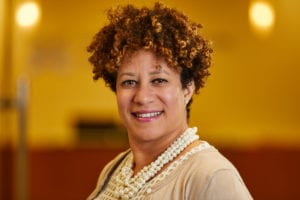March 2020

Branch Chief, NHGRI
ASHG: Why is public engagement with science important for both researchers and the public?
Dr. Easter: As researchers, when we think about the need to engage with the public as research participants and partners in the process, we want people to understand what they’re being asked to do and why it matters. This empowers them to make decisions about participation, but also makes it easier to find participants! The data shows that the public generally finds research participation to be important, not just for themselves and their families, but altruistically to benefit society. Getting the science out there enables the research community to work with a public that is willing, able, and eager.
On the public side, creating opportunities to engage with the science helps encourage the next generation of scientists. For students to think of science as a place they want to be, they need to see the good that our field does for people. That means there is a need for scientists to make that case to the intellectually curious, informed, and diverse next generation.
ASHG: What are some of the biggest current challenges in genomic literacy, and how are you working to address these?
Dr. Easter: Most students come into contact with genetics and genomics in a biology class or as a biology major, but for the public, it’s often one of two things: 1) individuals or their families are faced with a decision that forces them to try to understand a subject they may not have encountered in years, or 2) through popular culture and conversations around topics like direct-to-consumer genetic testing, people are coming to know more about genetics through companies.
In determining strategies for public engagement, important questions to consider include:
- What does the public needs to know, to give them what they need without being overwhelming?
- How much does the public need to know?
- What is the best way to deliver information?
Even answering these questions provides an important opportunity for public engagement and establishing relationships between scientists and the public. We’ve been working with communities of interest to ask these questions directly.
ASHG: A documentary based on Siddartha Mukherjee’s The Gene will be released in April 2020. How has NHGRI been involved in that and what impact might it have?
Dr. Easter: This is really exciting. Through a partnership with the local PBS affiliate WETA, NHGRI has been helping to support a documentary by executive producer Ken Burns. This has been my first experience with a project like this, and I’ve enjoyed getting to see the creative process of bringing a book to life and the positive responses we’ve received so far! By combining Burns’ storytelling approach with compelling personal stories, there will be many ways to reach the public and bring more attention to the promise of genetics and genomics research.
Part one of the documentary will premiere on WETA on April 7, 2020, at 8:00 pm U.S. Eastern Time, and part two will air on April 14.
ASHG: You have a PhD in molecular genetics. How did that lead you to your current position?
Dr. Easter: My career has been a story of being in the right place at the right time. After finishing my postdoc in molecular microbiology, I did a second postdoc in education that merged teaching with my hardcore science background. I got my own education in basically going back to my high school science knowledge and trying to be a partner in K-12 science education efforts. It’s humbling to think about what teachers do every day.
Through that experience in the educational setting, I learned firsthand that we as scientists can do a better job supporting education. After that second postdoc, I started working at Washington University School of Medicine’s Sequencing Center, which was looking for someone to oversee their outreach programs. This was right around the time that the human genome was first sequenced, and so it was an exciting time to be involved in that breakthrough.
From there, I took a position at the National Human Genome Research Institute, where I’ve gotten to learn about genomics education at the national level.
ASHG: What advice do you have for genetics professionals interested in public engagement?
Dr. Easter: There is no shortage of volunteer opportunities for geneticists who want to engage with the public: at schools, in museums, and with seniors, for example. Often, a small and specific engagement opportunity can be the most meaningful, especially if you’re looking into science engagement as a long-term endeavor or career; everyone in my branch at NHGRI had some experience working with people who don’t know much about science. Listening to the public and gaining that understanding – and the humility that goes with it – is what makes people well suited for this job.
There are a number of opportunities coming up in this area. The ASHG-NHGRI Genetics Education & Engagement Fellowship just opened applications for the 2020-21 fellowship, a 16-month position for early-career geneticists to transition to a career in public engagement with science. DNA Day, celebrated annually on April 25, is another opportunity to engage with your local schools and community around genetics. Now’s a great time to try!
